Volkswagen faces mounting pressure to keep up with Tesla and Chinese automakers in the transition to battery-electric vehicles (BEVs), and its success in doing so could have major implications.
During the pandemic, Volkswagen fell behind in the Chinese auto market as companies like BYD, Nio, and Tesla took over, with the competition nearly doubling the market’s EV and hybrid offerings (via Bloomberg). Volkswagen’s global sales of battery-electric vehicles (BEVs) haven’t managed to accelerate as fast as rivals Tesla or BYD, and the threat of growing EV startups also looms.
In the second quarter alone, Tesla delivered 466,140 as the world’s top BEV seller, followed by BYD with roughly 328,600 units sold, according to BloombergNEF. Volkswagen had just around 145,000 sales.
Credit: Bloomberg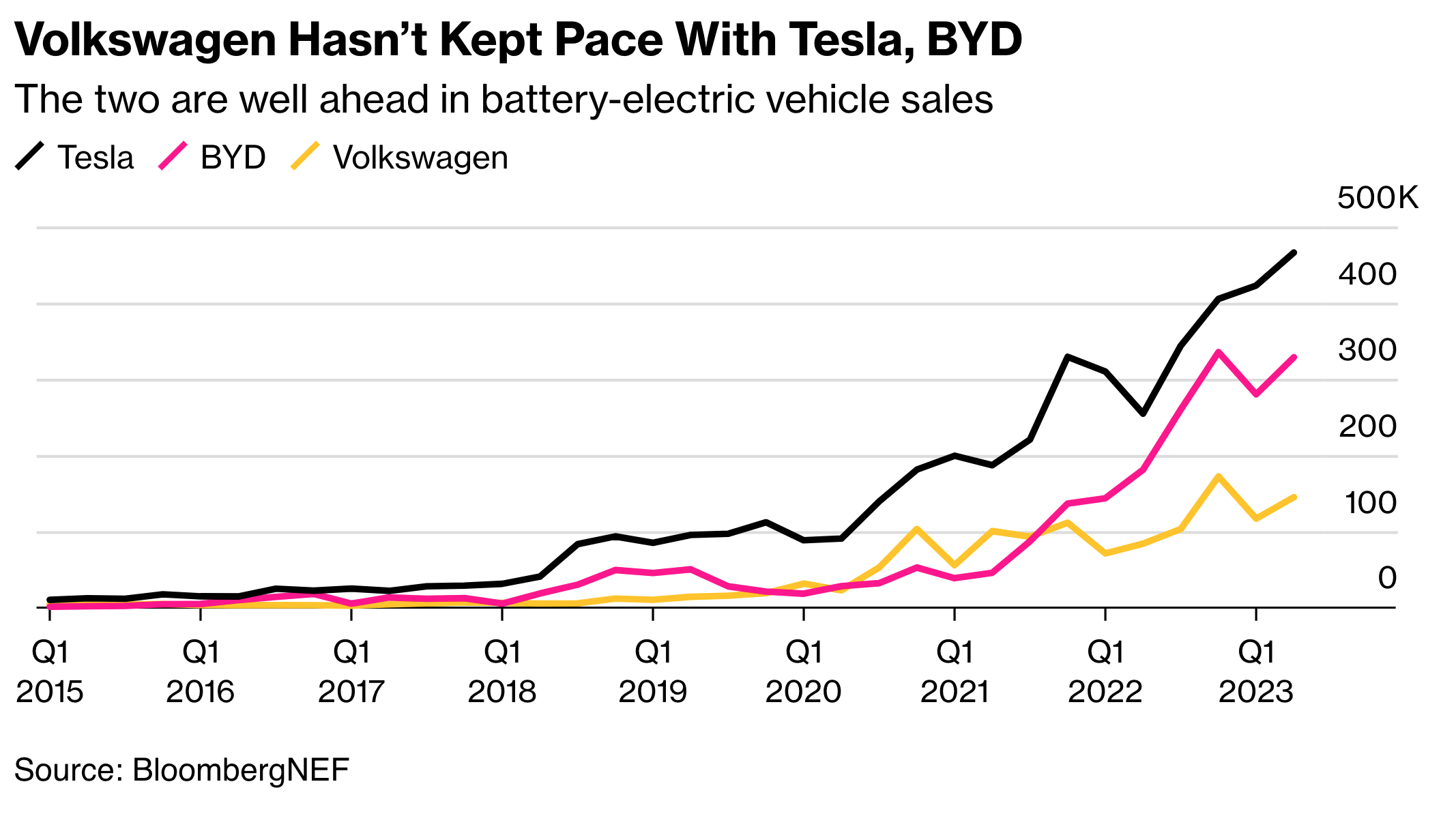
Now, as the presence of Chinese automakers and Tesla grows in Europe, Volkswagen is being tested by fierce competition, and the automaker risks severe consequences to the German economy, which is Europe’s largest economy. Foreign Minister Annalena Baerbock highlighted the urgency of the situation at the Münich Car Show last week.
“The auto industry is faced with the question of whether and how we will be a global leader in the future,” Baerbock said at the event. “For our nation, where the auto industry accounts for a large share of value creation, this is not just an economic issue, but also a question of security.”
Tesla’s upcoming release of the highly anticipated Cybertruck and its recently refreshed Model 3 Highland are set to increase pressures put on Volkswagen to make appealing BEVs, not to mention the U.S. automaker’s lineup-wide price cuts made throughout this year.
Meanwhile, the global EV market is growing rapidly, and BloombergNEF data predicts that BEV sales will nearly rival gas car sales in the global market by 2030, surpassing them altogether by 2031.
Credit: Bloomberg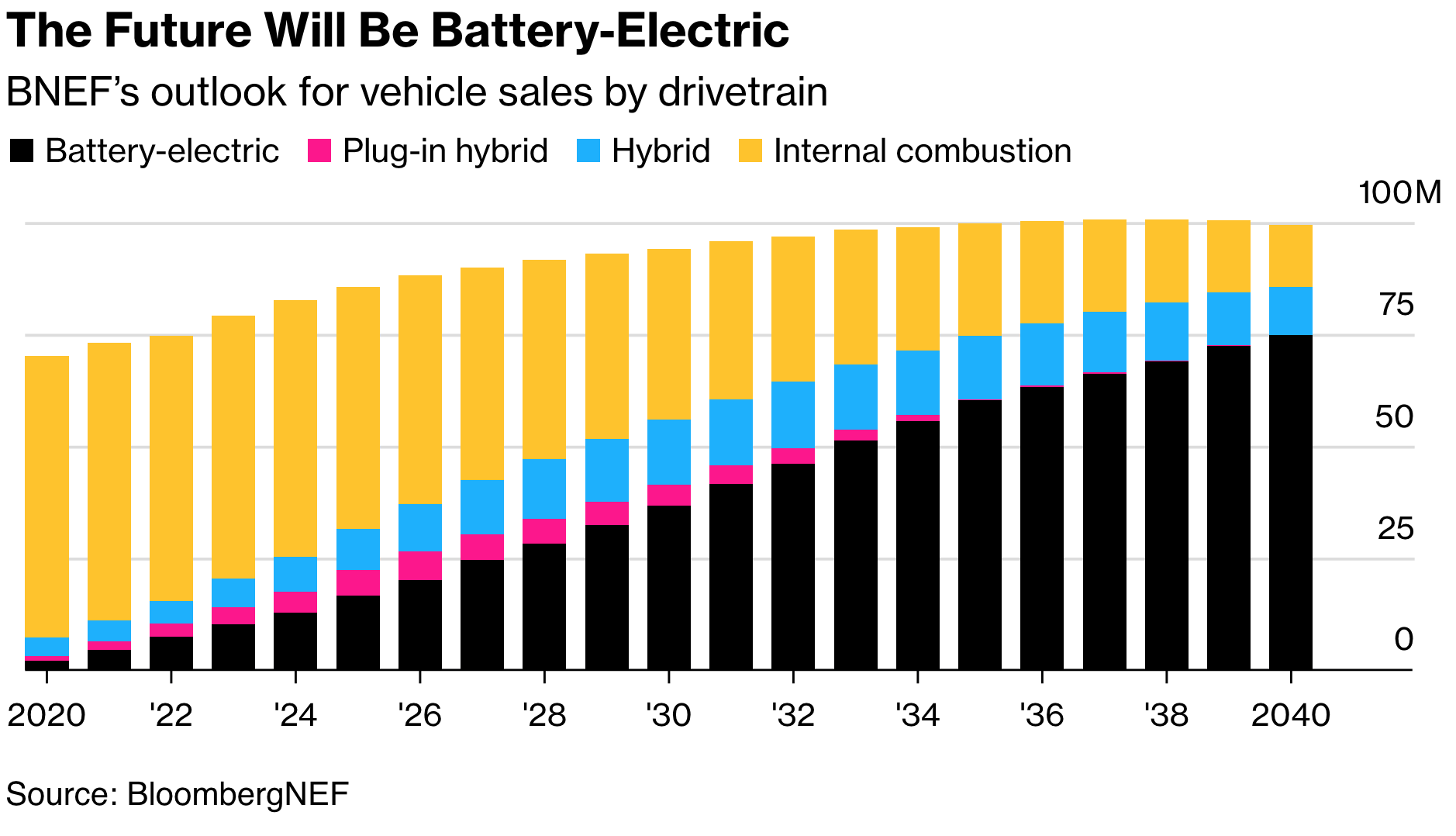
Volkswagen hasn’t exactly had a smooth introduction to BEVs. In 2015, the company admitted to cheating on emissions standards through the use of its “clean diesel” products, and it later paid out over $9.5 billion in settlement money to vehicle owners. Today, the automaker still hasn’t rebounded to pre-pandemic production levels across vehicle segments in Germany.
“Our international competition is not sitting idle,” said Hildegard Müller, the auto lobby German Association for the Automotive Industry (VDA) leader. “Our companies are mainly generating their profits abroad, helping to keep jobs in Germany. But the pressure is rising because of weak economic growth and conditions that are no longer internationally competitive.”
Credit: Bloomberg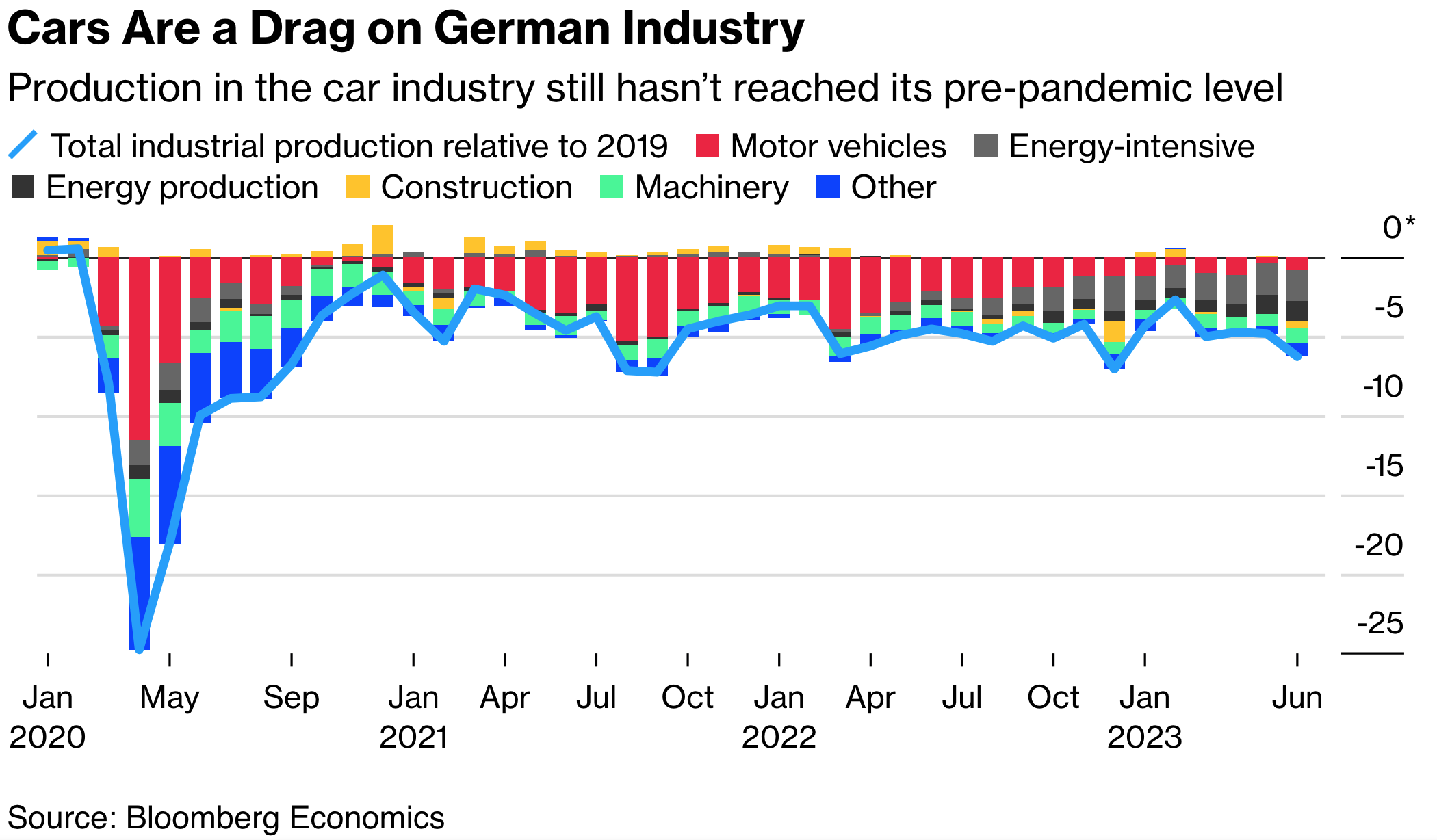
During the same period of time, Tesla has expanded significantly with the addition of new production facilities in Austin, Texas, within the U.S., and overseas in Shanghai, China and outside of Berlin, Germany. Earlier this year, Tesla also announced plans to debut an upcoming factory in Mexico.
In the last few years, Volkswagen has also seen a shake-up of executive power, with CEO Oliver Blume taking over for former CEO Herbert Diess last fall. Since taking over and retaining his title as head of Porsche, Blume has managed new partnerships and hopes to fix issues at Cariad, the automaker’s in-house software developer.
Earlier this week, a German publication reported that Volkswagen’s BEV plant in Zwickau, Germany would cut as many as 2,500 jobs, though the automaker hasn’t responded to the reports. The Zwickau facility has been exclusively producing BEVs since last January, and it produced a total of 218,000 units last year.
The German automaker also has plans to build a $2 billion BEV factory in South Carolina, which is expected to begin production in 2026. The plant will bring back the Volkswagen Scout as a BEV brand, along with other vehicles in the SUV and pickup segments.
Volkswagen’s Scout to build $40K electric SUV in South Carolina
What are your thoughts? Let me know at zach@teslarati.com, find me on X at @zacharyvisconti, or send your tips to us at tips@teslarati.com.

Elon Musk
Tesla Full Self-Driving set to get an awesome new feature, Elon Musk says
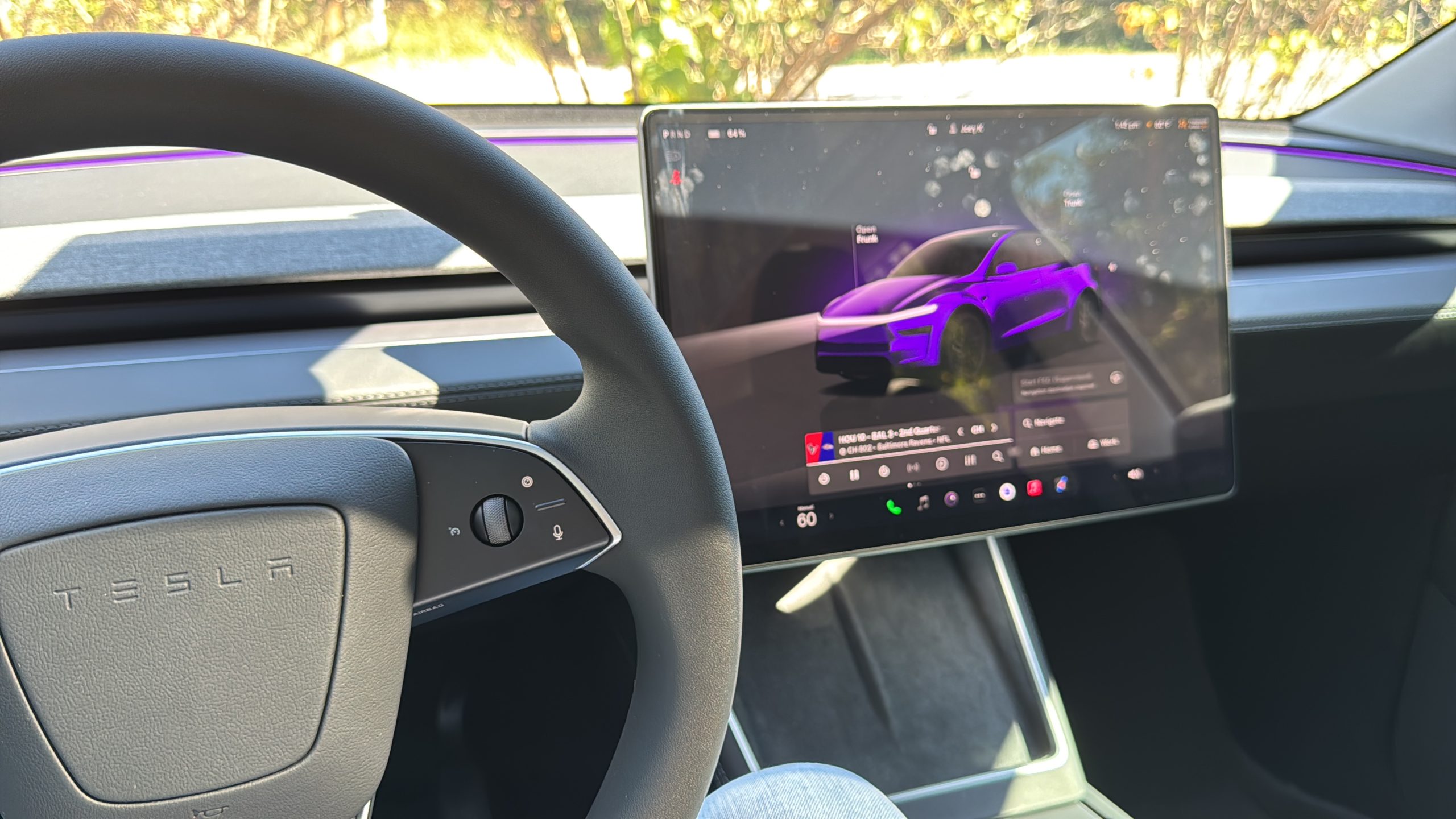
Tesla Full Self-Driving is set to get an awesome new feature in the near future, CEO Elon Musk confirmed on X.
Full Self-Driving is the company’s semi-autonomous driving program, which is among the best available to the general public. It still relies on the driver to ultimately remain in control and pay attention, but it truly does make traveling less stressful and easier.
However, Tesla still continuously refines the software through Over-the-Air updates, which are meant to resolve shortcomings in the performance of the FSD suite. Generally, Tesla does a great job of this, but some updates are definitely regressions, at least with some of the features.
Tesla Cybertruck owner credits FSD for saving life after freeway medical emergency
Tesla and Musk are always trying to improve the suite’s performance by fixing features that are presently available, but they also try to add new things that would be beneficial to owners. One of those things, which is coming soon, is giving the driver the ability to prompt FSD with voice demands.
For example, asking the car to park close to the front door of your destination, or further away in an empty portion of the parking lot, would be an extremely beneficial feature. Adjusting navigation is possible through Grok integration, but it is not always effective.
Musk confirmed that voice prompts for FSD would be possible:
Coming
— Elon Musk (@elonmusk) February 21, 2026
Tesla Full Self-Driving is a really great thing, but it definitely has its shortcomings. Navigation is among the biggest complaints that owners have, and it is easily my biggest frustration with using it. Some of the routes it chooses to take are truly mind-boggling.
Another thing it has had issues with is being situated in the correct lane at confusing intersections or even managing to properly navigate through local traffic signs. For example, in Pennsylvania, there are a lot of stop signs with “Except Right Turn” signs directly under.
This gives those turning right at a stop sign the opportunity to travel through it. FSD has had issues with this on several occasions.
Parking preferences would be highly beneficial and something that could be resolved with this voice prompt program. Grocery stores are full of carts not taken back by customers, and many people choose to park far away. Advising FSD of this preference would be a great advantage to owners.
Cybertruck
Elon Musk clarifies Tesla Cybertruck ’10 day’ comment, fans respond
Some are arguing that the decision to confirm a price hike in ten days is sort of counterproductive, especially considering it is based on demand. Giving consumers a timeline of just ten days to make a big purchase like a pickup truck for $60,000, and basically stating the price will go up, will only push people to make a reservation.
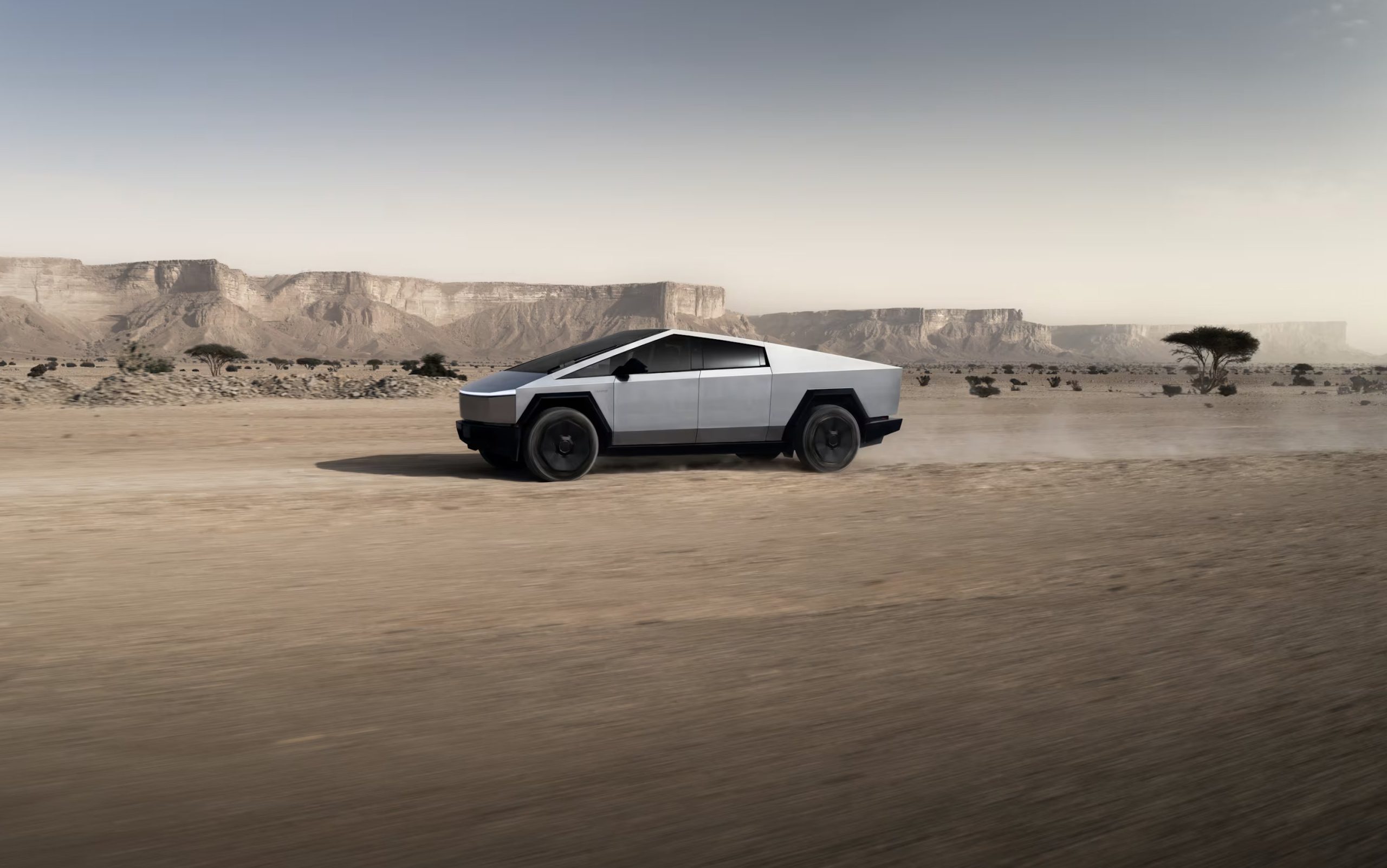
Elon Musk has clarified what he meant by his comment on X yesterday that seemed to indicate that Tesla would either do away with the new All-Wheel-Drive configuration of the Cybertruck or adjust the price.
The response was cryptic as nobody truly knew what Musk’s plans were for the newest Tesla Cybertruck trim level. We now have that answer, and fans of the company are responding in a polarizing fashion.
On Thursday night, Tesla launched the Cybertruck All-Wheel-Drive, priced competitively at $59,990. It was a vast improvement from the Rear-Wheel-Drive configuration Tesla launched last year at a similar price point, which was eventually cancelled just a few months later due to low demand.
Tesla launches new Cybertruck trim with more features than ever for a low price
However, Musk said early on Friday, “just for 10 days,” the truck would either be available or priced at $59,990. We can now confirm Tesla will adjust the price based on more recent comments from the CEO.
Musk said the price will fluctuate, but it “depends on how much demand we see at this price level.”
Depends on how much demand we see at this price level
— Elon Musk (@elonmusk) February 20, 2026
Some are defending the decision, stating that it is simply logical to see how the Cybertruck sells at this price and adjust accordingly.
Case 1: You don’t like it -> don’t buy it
Case 2 (me): You like it, it’s fits your situation and needs -> you buy it.
Case 3: Complain endlessly for no reason, you weren’t going to get one anyway, but you want people to know you’re mad, for some reason.Silly netizens.
— Ryan Scanlan 👥 (@Xenius) February 21, 2026
Others, not so much.
Alright I’m obviously not the one successful enough to be calling the shots at Tesla and worth almost a trillion dollars
But people were excited about the awesome Cybertruck news and then it got taken away, that’s why people are annoyed. The wording felt more like a threat.… pic.twitter.com/NWVNklcXoJ
— Dirty Tesla (@DirtyTesLa) February 21, 2026
No but fr wtf you doing dude???????
— Greggertruck (@greggertruck) February 20, 2026
It’s how it was communicated.
If it had been stated clearly on the website for everyone to see, everyone would be fine.— KiTT_2020 (@kitt_2020) February 20, 2026
Some are arguing that the decision to confirm a price hike in ten days is sort of counterproductive, especially considering it is based on demand. Giving consumers a timeline of just ten days to make a big purchase like a pickup truck for $60,000, and basically stating the price will go up, will only push people to make a reservation.
Demand will look strong because people want to lock in this price. The price will inevitably go up, and demand for the trim will likely fall a bit because of the increased cost.
Many are arguing Musk should have kept this detail internal, but transparency is a good policy to have. It is a polarizing move to confirm a price increase in just a week-and-a-half, but the community is obviously split on how to feel.
Cybertruck
Tesla Cybertruck’s newest trim will undergo massive change in ten days, Musk says
It appears as if the new All-Wheel-Drive trim of Cybertruck won’t be around for too long, however. Elon Musk revealed this morning that it will be around “only for the next 10 days.”
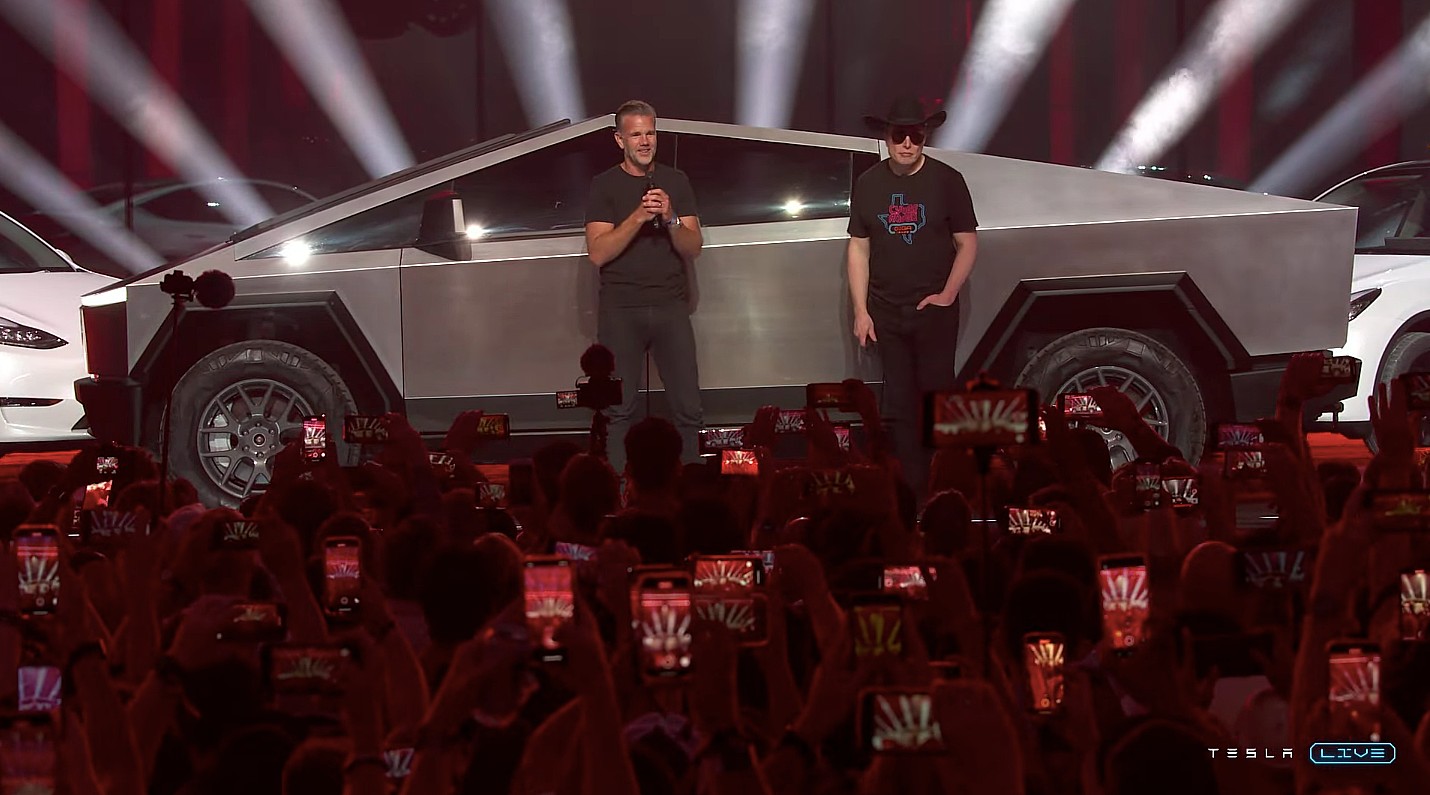
Tesla’s new Cybertruck trim has already gotten the axe from CEO Elon Musk, who said the All-Wheel-Drive configuration of the all-electric pickup will only be available “for the next ten days.”
Musk could mean the price, which is $59,990, or the availability of the trim altogether.
Last night, Tesla launched the All-Wheel-Drive configuration of the Cybertruck, a pickup that comes in at less than $60,000 and features a competitive range and features that are not far off from the offerings of the premium trim.
Tesla launches new Cybertruck trim with more features than ever for a low price
It was a nice surprise from Tesla, considering that last year, it offered a Rear-Wheel-Drive trim of the Cybertruck that only lasted a few months. It had extremely underwhelming demand because it was only $10,000 cheaper than the next trim level up, and it was missing a significant number of premium features.
Simply put, it was not worth the money. Tesla killed the RWD Cybertruck just a few months after offering it.
With the news that Tesla was offering this All-Wheel-Drive configuration of the Cybertruck, many fans and consumers were encouraged. The Cybertruck has been an underwhelming seller, and this seemed to be a lot of truck for the price when looking at its features:
- Dual Motor AWD w/ est. 325 mi of range
- Powered tonneau cover
- Bed outlets (2x 120V + 1x 240V) & Powershare capability
- Coil springs w/ adaptive damping
- Heated first-row seats w/ textile material that is easy to clean
- Steer-by-wire & Four Wheel Steering
- 6’ x 4’ composite bed
- Towing capacity of up to 7,500 lbs
- Powered frunk
It appears as if this trim of Cybertruck won’t be around for too long, however. Musk revealed this morning that it will be around “only for the next 10 days.”
Only for the next 10 days https://t.co/82JnvZQGh2
— Elon Musk (@elonmusk) February 20, 2026
Musk could mean the price of the truck and not necessarily the ability to order it. However, most are taking it as a cancellation.
If it is, in fact, a short-term availability decision, it is baffling, especially as Tesla fans and analysts claim that metrics like quarterly deliveries are no longer important. This seems like a way to boost sales short-term, and if so many people are encouraged about this offering, why would it be kept around for such a short period of time?
Some are even considering the potential that Tesla axes the Cybertruck program as a whole. Although Musk said during the recent Q4 Earnings Call that Cybertruck would still be produced, the end of the Model S and Model X programs indicates Tesla might be prepared to do away with any low-volume vehicles that do not contribute to the company’s future visions of autonomy.
The decision to axe the car just ten days after making it available seems like a true head-scratcher.








